





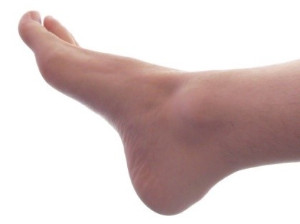 There are over 100 different varieties of HPV, or human papilloma virus. Nearly 12% of the global population have had warts at one time, and plantar warts are but one of these types. They all share one basic characteristic, they have the ability to infect skin cells. Many people, when they hear the term HPV, think that it refers to genital warts. But this is not the case, and HPV can manifest itself in many different forms. Plantar warts occur on the feet, typically on the palms or the soles. They can be flat or raised, and usually occur in dry, cracked areas of the foot. Treatments vary in scope and effectiveness. If you think you may have a plantar wart, talk to your podiatrist and go through the treatment options available.
There are over 100 different varieties of HPV, or human papilloma virus. Nearly 12% of the global population have had warts at one time, and plantar warts are but one of these types. They all share one basic characteristic, they have the ability to infect skin cells. Many people, when they hear the term HPV, think that it refers to genital warts. But this is not the case, and HPV can manifest itself in many different forms. Plantar warts occur on the feet, typically on the palms or the soles. They can be flat or raised, and usually occur in dry, cracked areas of the foot. Treatments vary in scope and effectiveness. If you think you may have a plantar wart, talk to your podiatrist and go through the treatment options available.
Plantar warts can be very uncomfortable. If you need your feet checked, contact one of our podiatrists from Active Foot and Ankle Care, LLC. Our doctors will assist you with all of your foot and ankle needs.
About Plantar Warts
Plantar warts are the result of HPV, or human papillomavirus, getting into open wounds on the feet. They are mostly found on the heels or balls of the feet.
While plantar warts are generally harmless, those experiencing excessive pain or those suffering from diabetes or a compromised immune system require immediate medical care. Plantar warts are easily diagnosed, usually through scraping off a bit of rough skin or by getting a biopsy.
Symptoms
Treatment
To help prevent developing plantar warts, avoid walking barefoot over abrasive surfaces that can cause cuts or wounds for HPV to get into. Avoiding direct contact with other warts, as well as not picking or rubbing existing warts, can help prevent the further spread of plantar warts. However, if you think you have developed plantar warts, speak to your podiatrist. He or she can diagnose the warts on your feet and recommend the appropriate treatment options.
If you have any questions please feel free to contact our offices located in Fair Lawn, Riverdale, and Englewood, NJ . We offer the newest diagnostic and treatment technologies for all your foot and ankle needs.
Read more about All About Plantar Warts Geoff Swaim, tight end of the Dallas Cowboys, will most likely be out of play until the team’s training camp due to last week’s foot surgery. The injury itself was sustained during the Cowboys’ informal workouts last week at The Star. After suffering the injury, Swaim had a screw inserted into his foot to help secure the bones in place. He will most likely be back when the Cowboys return for training camp in Oxnard, California, in July. The tight end is no stranger to injuries and surgeries; last season, Swaim missed the final seven games due to a torn pectoral tendon that needed surgery. Swaim was able to make a full recovery since.
Geoff Swaim, tight end of the Dallas Cowboys, will most likely be out of play until the team’s training camp due to last week’s foot surgery. The injury itself was sustained during the Cowboys’ informal workouts last week at The Star. After suffering the injury, Swaim had a screw inserted into his foot to help secure the bones in place. He will most likely be back when the Cowboys return for training camp in Oxnard, California, in July. The tight end is no stranger to injuries and surgeries; last season, Swaim missed the final seven games due to a torn pectoral tendon that needed surgery. Swaim was able to make a full recovery since.
Foot surgery is sometimes necessary to treat a foot ailment. To learn more, contact one of our podiatrists of Active Foot and Ankle Care, LLC. Our doctors will assist you with all of your foot and ankle needs.
When Is Surgery Necessary?
Foot and ankle surgery is generally reserved for cases in which less invasive, conservative procedures have failed to alleviate the problem. Some of the cases in which surgery may be necessary include:
What Types of Surgery Are There?
The type of surgery you receive will depend on the nature of the problem you have. Some of the possible surgeries include:
Benefits of Surgery
Although surgery is usually a last resort, it can provide more complete pain relief compared to non-surgical methods and may allow you to finally resume full activity.
Surgical techniques have also become increasingly sophisticated. Techniques like endoscopic surgery allow for smaller incisions and faster recovery times.
If you have any questions please feel free to contact our offices located in Fair Lawn, Riverdale, and Englewood, NJ . We offer the newest diagnostic and treatment technologies for all your foot and ankle needs.
Read more about Foot Surgery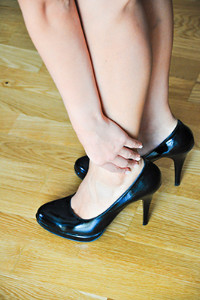 New findings published by scientists in Brazil have concluded that wearing improper-fitting high heels can potentially cause the wearer to suffer anxiety. By wearing ill-fitting shoes, conditions such as bunions and ingrown toenails become more prevalent. In turn, this can lead to frequent falls and an anxious disposition. Researchers previously found that 83 percent of people don’t wear the correct shoe size. To prevent the development of foot conditions, be sure to wear proper footwear that is comfortable and well-fitting.
New findings published by scientists in Brazil have concluded that wearing improper-fitting high heels can potentially cause the wearer to suffer anxiety. By wearing ill-fitting shoes, conditions such as bunions and ingrown toenails become more prevalent. In turn, this can lead to frequent falls and an anxious disposition. Researchers previously found that 83 percent of people don’t wear the correct shoe size. To prevent the development of foot conditions, be sure to wear proper footwear that is comfortable and well-fitting.
High heels have a history of causing foot and ankle problems. If you have any concerns about your feet or ankles, contact one of our podiatrists from Active Foot and Ankle Care, LLC. Our doctors can provide the care you need to keep you pain-free and on your feet.
Effects of High Heels on the Feet
High heels are popular shoes among women because of their many styles and societal appeal. Despite this, high heels can still cause many health problems if worn too frequently.
Which Parts of My Body Will Be Affected by High Heels?
What Kinds of Foot Problems Can Develop from Wearing High Heels?
How Can I Still Wear High Heels and Maintain Foot Health?
If you want to wear high heeled shoes, make sure that you are not wearing them every day, as this will help prevent long term physical problems. Try wearing thicker heels as opposed to stilettos to distribute weight more evenly across the feet. Always make sure you are wearing the proper shoes for the right occasion, such as sneakers for exercising. If you walk to work, try carrying your heels with you and changing into them once you arrive at work. Adding inserts to your heels can help cushion your feet and absorb shock. Full foot inserts or metatarsal pads are available.
If you have any questions please feel free to contact our offices located in Fair Lawn, Riverdale, and Englewood, NJ . We offer the newest diagnostic and treatment technologies for all your foot and ankle needs.
Read more about Effect of High Heels on the Feet In a recent study conducted in the Boston area, correlations between obesity, foot pain, and foot disorders were investigated. The sample size of the study was 2445 men and women with an average age of 68. In men, severe obesity, defined as having a body mass index (BMI) of 35 kg/m^2 or more, was found to be associated with foot pain. For women, both moderate (30-34.99) and severe obesity were associated with foot pain. The general conclusion of the study was that regardless of foot posture and dynamic foot function, as one’s BMI increased the likelihood of foot pain increased as well.
In a recent study conducted in the Boston area, correlations between obesity, foot pain, and foot disorders were investigated. The sample size of the study was 2445 men and women with an average age of 68. In men, severe obesity, defined as having a body mass index (BMI) of 35 kg/m^2 or more, was found to be associated with foot pain. For women, both moderate (30-34.99) and severe obesity were associated with foot pain. The general conclusion of the study was that regardless of foot posture and dynamic foot function, as one’s BMI increased the likelihood of foot pain increased as well.
Obesity has become very problematic at this point in time and can have extremely negative effects on the feet. If you’re an obese individual and are concerned about your feet, contact one of our podiatrists from Active Foot and Ankle Care, LLC. Our doctors can provide the care you need to keep you pain-free and on your feet.
Obesity and Your Feet
Since your feet are what support your entire weight when standing, any additional weight can result in pain and swelling. Being overweight is one of the main contributors to foot complications.
Problems & Complications
Extra Weight – Even putting on just a few extra pounds could create serious complications for your feet. As your weight increases, your balance and body will shift, creating new stresses on your feet. This uneven weight distribution can cause pain, even while doing the simplest tasks, such as walking.
Diabetes – People who are overweight are at serious risk of developing type-2 diabetes, which has a drastic impact on the health of your feet. As you get older, your diabetes might worsen, which could lead to loss of feeling in your feet, sores, and bruises. You could also become more prone to various infections.
Plantar fasciitis – Pressure and stress that is placed on muscles, joints, and tendons can trigger plantar fasciitis, which is an inflammation of tissue that forms along the bottom of the foot.
If you have any questions please feel free to contact our offices located in Fair Lawn, Riverdale, and Englewood, NJ . We offer the newest diagnostic and treatment technologies for all your foot and ankle needs.
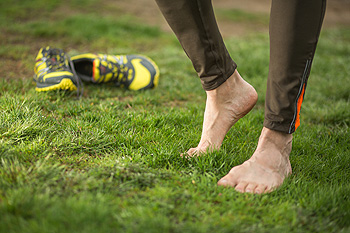 Among foot conditions, calluses and corns are often seen as some of the more harmless concerns. Regardless, if a callus does become troublesome, there are methods available for removal. Because calluses are essentially small areas of thick, hardened skin, softening calluses can help aid in their removal. Soaking the feet in warm water and avoiding using harsh soaps while washing can help maintain softness of the skin. Hard areas can also be buffed away using a pumice stone. If you are suffering from calluses and seek ways to remove them, consult with your podiatrist.
Among foot conditions, calluses and corns are often seen as some of the more harmless concerns. Regardless, if a callus does become troublesome, there are methods available for removal. Because calluses are essentially small areas of thick, hardened skin, softening calluses can help aid in their removal. Soaking the feet in warm water and avoiding using harsh soaps while washing can help maintain softness of the skin. Hard areas can also be buffed away using a pumice stone. If you are suffering from calluses and seek ways to remove them, consult with your podiatrist.
If you have any concerns regarding your feet and ankles, contact one of our podiatrists of Active Foot and Ankle Care, LLC. Our doctors will treat your foot and ankle needs.
Corns: What Are They? and How Do You Get Rid of Them?
Corns can be described as areas of the skin that have thickened to the point of becoming painful or irritating. They are often layers and layers of the skin that have become dry and rough, and are normally smaller than calluses.
Ways to Prevent Corns
There are many ways to get rid of painful corns such as wearing:
Treating Corns
Treatment of corns involves removing the dead skin that has built up in the specific area of the foot. Consult with Our doctors to determine the best treatment option for your case of corns.
If you have any questions please feel free to contact our offices located in Fair Lawn, Riverdale, and Englewood, NJ . We offer the newest diagnostic and treatment technologies for all your foot and ankle needs.
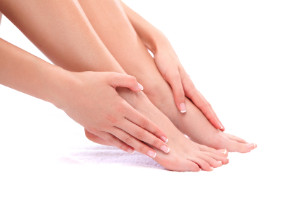 If you’re experiencing pain at the sole of your feet, you may have plantar fasciitis. The words plantar, meaning “the bottom of the foot,” and fasciitis, meaning “inflammation of fascia,” describe the inflammation of our plantar fascia, the tough band of tissue (ligament) lining the bottom of our feet. Plantar fasciitis is one of the most common foot problems seen in patients, caused by factors like continual stress or injury, as the plantar fascia becomes sensitive and can impact everyday movement. Athletes and those who exercise often are most susceptible to plantar fasciitis. Treatments such as cortisone injections, anti-inflammatory medications, therapy, icing, and arch supports can all help treat plantar fasciitis.
If you’re experiencing pain at the sole of your feet, you may have plantar fasciitis. The words plantar, meaning “the bottom of the foot,” and fasciitis, meaning “inflammation of fascia,” describe the inflammation of our plantar fascia, the tough band of tissue (ligament) lining the bottom of our feet. Plantar fasciitis is one of the most common foot problems seen in patients, caused by factors like continual stress or injury, as the plantar fascia becomes sensitive and can impact everyday movement. Athletes and those who exercise often are most susceptible to plantar fasciitis. Treatments such as cortisone injections, anti-inflammatory medications, therapy, icing, and arch supports can all help treat plantar fasciitis.
Plantar fasciitis can be very painful and inconvenient. If you are experiencing heel pain or symptoms of plantar fasciitis, contact one of our podiatrists from Active Foot and Ankle Care, LLC. Our doctors can provide the care you need to keep you pain-free and on your feet.
What Is Plantar Fasciitis?
Plantar fasciitis is the inflammation of the thick band of tissue that runs along the bottom of your foot, known as the plantar fascia, and causes mild to severe heel pain.
What Causes Plantar Fasciitis?
How Can It Be Treated?
While very treatable, plantar fasciitis is definitely not something that should be ignored. Especially in severe cases, speaking to your doctor right away is highly recommended to avoid complications and severe heel pain. Your podiatrist can work with you to provide the appropriate treatment options tailored to your condition.
If you have any questions please feel free to contact our offices located in Fair Lawn, Riverdale, and Englewood, NJ . We offer the newest diagnostic and treatment technologies for all your foot and ankle needs.
Read more about Plantar FasciitisLooking at a person’s feet can help determine how healthy their overall body is. Some important factors to look for include: sudden or chronic pain in the feet, skin discoloration which can indicate a more serious problem, and numbness or peripheral neuropathy which is typically associated with diabetes. Other symptoms of potential health problems are: swelling or edema which can be caused by insufficient veins or lymphatic ducts, cold feet which is most commonly associated with arterial disease, itchy feet which is associated with fungal infections, and changes in your foot structure, such as flatfoot. Overall, any noticeable changes should be looked at by your podiatrist, as our feet are the bedrock of our bodies.
Everyday foot care is very important to prevent infection and other foot ailments. If you need your feet checked, contact one of our podiatrists from Active Foot and Ankle Care, LLC. Our doctors can provide the care you need to keep you pain-free and on your feet.
Everyday Foot Care
Often, people take care of their bodies, face and hair more so than they do for their feet. But the feet are a very important aspect of our bodies, and one that we should pay more attention to. Without our feet, we would not be able to perform most daily tasks.
It is best to check your feet regularly to make sure there are no new bruises or cuts that you may not have noticed before. For dry feet, moisturizer can easily be a remedy and can be applied as often as necessary to the affected areas. Wearing shoes that fit well can also help you maintain good foot health, as well as making it easier to walk and do daily activities without the stress or pain of ill-fitting shoes, high heels, or even flip flops. Wearing clean socks with closed shoes is important to ensure that sweat and bacteria do not accumulate within the shoe. Clean socks help to prevent Athlete’s foot, fungi problems, bad odors, and can absorb sweat.
If you have any questions please feel free to contact our offices located in Fair Lawn, Riverdale, and Englewood, NJ . We offer the newest diagnostic and treatment technologies for all your foot and ankle needs.
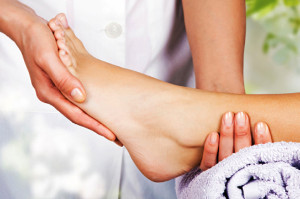 Known as a chronic autoimmune disease, lupus and its symptoms are similar to that of arthritis, affecting the tissues in the joints and leading to various problems in the feet including bunions, claw toes, and hammertoes. Lupus can also lead to tendonitis, loss of feeling or neuropathy, muscle inflammation, corns and calluses, swollen feet or oedema, and more. It is especially important to watch lupus symptoms, as infections such as gangrene can develop in a healthy person. Visit your podiatrist to assess your condition, as well as invest in proper footwear with insoles.
Known as a chronic autoimmune disease, lupus and its symptoms are similar to that of arthritis, affecting the tissues in the joints and leading to various problems in the feet including bunions, claw toes, and hammertoes. Lupus can also lead to tendonitis, loss of feeling or neuropathy, muscle inflammation, corns and calluses, swollen feet or oedema, and more. It is especially important to watch lupus symptoms, as infections such as gangrene can develop in a healthy person. Visit your podiatrist to assess your condition, as well as invest in proper footwear with insoles.
When dealing with systemic disease of the feet, it is extremely important to check the affected areas routinely so that any additional problems are caught quickly. If you have any concerns about your feet and ankles contact one of our podiatrists from Active Foot and Ankle Care, LLC. Our doctors will assist you with all of your podiatric needs.
Systemic Diseases of the Feet
Systemic diseases affect the whole body, and symptoms usually are displayed in the feet. This condition can make a patient’s ability to walk unbearable. Systemic diseases include gout, diabetes mellitus, neurological disorders, and arthritis.
Gout – is caused by an excess of uric acid in the body. Common symptoms include pain, inflammation, and redness at the metatarsal/phalangeal joint of the base big toe. Gout can be treated by NSAIDs to relieve pain and inflammation, and other drugs that lower the acid levels in the body.
Diabetes mellitus – is an increase in the level of blood sugar that the body cannot counteract with its own insulin. Failure to produce enough insulin is a factor in Diabetes.
Diabetes of the Feet
Diabetic Neuropathy – may lead to damaged nerves and affect the feet through numbness and loss of sensation.
Peripheral Vascular Disease – can restrict the blood flow to the feet, and often times lead to amputation of the feet.
If you have any questions please feel free to contact our offices located in Fair Lawn, Riverdale, and Englewood, NJ . We offer the newest diagnostic and treatment technologies for all your foot and ankle needs.
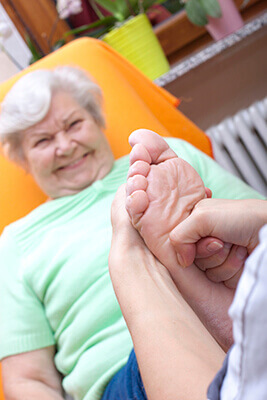 The hustle and bustle of the past holiday season may have taken a toll on your feet going into the new year. Diabetics in particular may be especially affected by the extra wear and tear the holidays bring. To allow the feet to recover from an active holiday season, consider the following tips. Maintain healthy eating habits and always monitor your blood glucose levels, clean feet daily with warm water and mild soap, moisturize dry and cracked skin, give the feet a break and put them up when sitting or resting, and wear shoes that are comfortable and broken in.
The hustle and bustle of the past holiday season may have taken a toll on your feet going into the new year. Diabetics in particular may be especially affected by the extra wear and tear the holidays bring. To allow the feet to recover from an active holiday season, consider the following tips. Maintain healthy eating habits and always monitor your blood glucose levels, clean feet daily with warm water and mild soap, moisturize dry and cracked skin, give the feet a break and put them up when sitting or resting, and wear shoes that are comfortable and broken in.
Diabetic foot care is important in preventing foot ailments such as ulcers. If you are suffering from diabetes or have any other concerns about your feet, contact one of our podiatrists from Active Foot and Ankle Care, LLC. Our doctors can provide the care you need to keep you pain-free and on your feet.
Diabetic Foot Care
Diabetes affects millions of people every year. Diabetes can damage blood vessels in many parts of the body, including the feet. Because of this, taking care of your feet is essential if you have diabetes, and having a podiatrist help monitor your foot health is highly recommended.
The Importance of Caring for Your Feet
Patients with diabetes should have their doctor monitor their blood levels because blood sugar levels play such a huge role in diabetic care. Monitoring these levels on a regular basis is highly advised.
It is always best to inform your healthcare professional of any concerns you may have regarding your feet, especially for diabetic patients. Early treatment and routine foot examinations are keys to maintaining proper health, especially because severe complications can arise if proper treatment is not applied.
If you have any questions please feel free to contact our offices located in New Jersey. We offer the newest diagnostic and treatment technologies for all your foot and ankle needs.
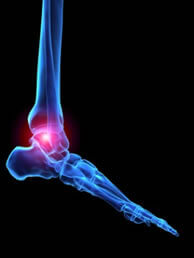 Arthritis is a condition that many people are familiar with but that not many fully understand. Successful treatment of the condition depends on the correct diagnosis, and arthritis can take on three different types: osteoarthritis, rheumatoid arthritis, and psoriatic arthritis. Each type of arthritis has its own various symptoms and treatments. If you are suffering from arthritis in your feet, consult with your podiatrist to determine the right diagnosis and the best treatment.
Arthritis is a condition that many people are familiar with but that not many fully understand. Successful treatment of the condition depends on the correct diagnosis, and arthritis can take on three different types: osteoarthritis, rheumatoid arthritis, and psoriatic arthritis. Each type of arthritis has its own various symptoms and treatments. If you are suffering from arthritis in your feet, consult with your podiatrist to determine the right diagnosis and the best treatment.
Arthritis can be a difficult condition to live with. If you are seeking treatment, contact one of our podiatrists from Active Foot and Ankle Care, LLC. Our doctors can provide the care you need to keep you pain-free and on your feet.
Arthritic Foot Care
Arthritis is a joint disorder that involves inflammation of different joints in your body, such as in your feet. Arthritis is often caused by a degenerative joint disease and causes mild to severe pain in all affected areas. On top of this, swelling and stiffness in the affected joints can also be a common symptom of arthritis.
In many cases, wearing ill-fitting shoes can worsen the effects and pain of arthritis. Wearing shoes that have a lower heel and extra room can help your feet feel more comfortable. In cases of rheumatoid arthritis, the arch in your foot may become problematic. Buying shoes with proper arch support that contour to your feet can help immensely.
Alleviating Arthritic Pain
It is best to see your doctor for the treatment that is right for your needs and symptoms. Conditions vary, and a podiatrist can help you determine the right method of care for your feet.
If you have any questions please feel free to contact our offices located in New Jersey. We offer the newest diagnostic and treatment technologies for all your foot and ankle needs.






